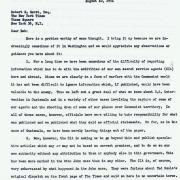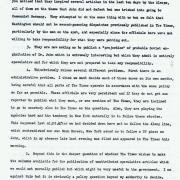(originally published October 7, 2015 at indyradio.info)
Photos prove New York Times was complicit in the coverup of the CIA takeover in Guatemala, and show an increasing influence on what saw print starting as early as 1954. James Reston seems to question the trend in this letter, but he eventually learned who buttered his bread. Henry Kissinger held the knife. Reston enjoyed a long and well-rewarded career.
James Reston seems to question the trend in this letter, but he eventually learned who buttered his bread. Henry Kissinger held the knife. Reston enjoyed a long and well-rewarded career.
"the CIA is asking us to publish speculative articles... and to do so on our own authority"
Photos of the letter transcribed here are linked from the thumbnails.
August 10,1954
Robert E. Garst, Esq.
The New York Times
Times
New York 36, N.Y.
Dear Bob,
Here is a problem worthy of some thought. I bring it up because we are increasingly conscious of it in Washington and we would appreciate any observations or guidance you have about it.
(1.) For along time we have been conscious of the difficulty of reporting the information which has to do with the activities of our own secret service agents (CIA) here and abroad. Since we are clearly in a form of warfare with the communist world it has not been difficult to ignore information which, if published, would have been valuable to the enemy. Thus we left out a great deal of what we knew about U.S. Intervention in Guatemala and in a variety of other cases involving the capture of some of our agents and the shooting down of some of our planes over communist territory. In all of these cases, however, officials were willing to take responsibility for what was published and we published what they said as official statements. So far, as in the case of Guatemala, we have been merely leaving things out of the paper.
(2.) Now, however, the CIA is asking us to go beyond this and publish speculative articles which may or may not be based on correct premises, and to do so on our own authority without any attribution to them or to anyone else in this government. This has been more marked in the Otto John Case than in any other. The CIA is, of course, very embarrassed by what happened in the Otto John case. They were furious about Tad Szulc's original dispatch on the front page of The Times and said so here in no uncertain terms. They were also upset by several Times dispatches out of Bonn to the effect that John had "defected" to the East.
(Both the British and French Embassies support the theory
***end of first typed page***
Robert E. Garst - 2 - August 10, 1954
that he was a defector). Nevertheless, (and no doubt for reasons that are in the national interest) the CIA has set out to "counteract" these stories. I am sure you noticed that they inspired several articles in the last ten days by the Alsop, all of them on the theme that John did not defect but was tricked into going to Communist Germany. They attempted to do the same thing with us but we felt that Washington should not be second-guessing dispatches previously published in The Times, particularly by the men on the spot, and especially since the officials here were not willing to take responsibility for what they were putting out.
(3.) They are now asking us to publish a "projection" of probable Soviet exploitation of Dr. John which is extremely interesting but which they admit is entirely speculative and for which they are not prepared to take any responsibility.
(4.) This obviously raises several problems. First there is an administrative problem. I think we must decide each of these cases on its own merits, being careful that all parts of The Times operate in accordance with the same policy so far as possible. These officials are very persistent and if they do not get one reporter to publish what they want, or one section of the Times, they are inclined to go to somebody else in The Times on the question. Also, they are playing the agencies hard and the tendency in New York naturally is to follow the stories. This happened last night. After we had decided down here not to follow the Alsop line, which contradicted our own Bonn bureau, New York asked us to follow a UP piece on John, which in my absence late last evening was filed and appeared in The Times this morning.
(5.) beyond this is the deeper question of whether The Times wishes to make its columns available for the publication of unattributed speculative articles which we would not normally publish but it is obviously a policy question beyond my authority to decide. I think we will have little trouble with these questions provided we are all conscious of what is going on.
I raise it now so that we can be thinking about it, and I would be grateful if you have any observations on the subject.
Sincerely,
JBR:IH
James Reston
###
David Roknich,
INDYRADIO The future of radio comes not from the Tower of Corporate Media but belongs to us. The newest playlists are linked at http://ch0.us
